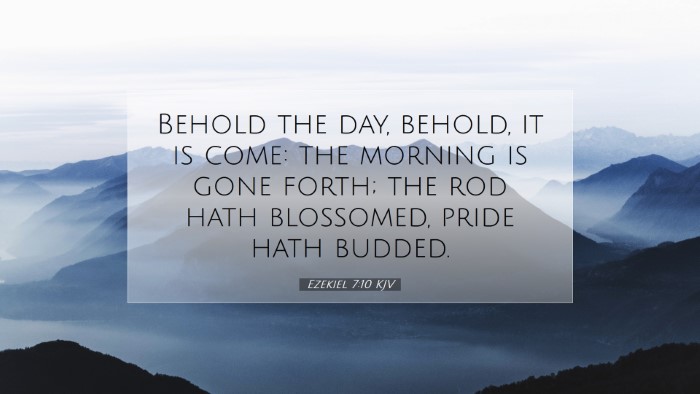Ezekiel 7:10 Commentary
Ezekiel 7:10: "Behold the day! Behold, it is come: the morning is gone forth; the rod hath blossomed, pride hath budded."
Introduction
The verse opens the prophetic oracles of condemnation, highlighting the imminent judgment upon Israel. This judgment is portrayed using agricultural imagery, which connects deeply with the culture of ancient Israel. Let us explore the key components of this verse while drawing from the insights of public domain commentaries by Matthew Henry, Albert Barnes, and Adam Clarke.
The Significance of "Behold the Day!"
"Behold the Day!" suggests a moment of attention and urgency. Matthew Henry notes that this phrase serves as a call to witness the forthcoming destruction. The exclamation emphasizes that the day of the Lord's judgment has arrived, distinguishing it from mere ordinary days. For the faithful, this statement is an ominous herald of catastrophe.
Impending Judgment
The phrase "it is come" indicates both the inevitability and the proximity of judgment. Albert Barnes interprets this urgency as reflective of a divine timeline that cannot be altered. The prophetic word of Ezekiel underscores God’s active response to Israel’s transgressions, fulfilling the warnings previously given through earlier prophets. This evokes serious contemplation for modern readers about the seriousness of sin and divine accountability.
A Shift in the Spiritual Climate
"The morning is gone forth;" denotes a new reality emerging from darkness. Adam Clarke emphasizes the transition from night to morning as symbolic of judgment’s light exposing the corruption within Israel. It builds on the idea that the dawn of understanding is often bitter and exposes the consequences of past behaviors. Here, the prophet presents a vivid image where the light of day reflects the clarity with which God sees the iniquity of His people.
A Symbolic Appearance: "The rod hath blossomed"
The phrase "the rod hath blossomed" carries with it a dual aspect. Matthew Henry suggests that the rod symbolizes authority and punishment, and its blossoming indicates the fruition of God’s pronouncements against sin. This imagery may imply that the discipline God has set is now coming to maturity. It serves as a reminder that divine justice does not lie dormant but comes to fruition in its appointed season.
Pride's Wrath: "Pride hath budded"
Here, "pride hath budded" speaks to the root of Israel's failures. Albert Barnes points out that pride leads to spiritual blindness and unshackle behavior. The budding of pride signifies the point of no return, where arrogance and disdain for God’s commandments lead to their own destruction. This lesson resonates with readers today, inciting consideration of how pride may lead communities and individuals away from divine favor.
Theological Implications
This verse encapsulates the intersection of God’s sovereignty and human accountability. It reminds pastors and theologians of the serious implications of disregard for divine commands. Matthew Henry highlights the need for humility and repentance, emphasizing that acknowledgment of pride is the first step toward restoration. The unfolding of judgment becomes a pivotal opportunity for communal introspection and return to righteousness.
Practical Applications for Today
- Awareness of Divine Judgment: Pastors are called to emphasize accountability among their congregations. Just as Ezekiel called the Israelites to attention, modern leaders must highlight spiritual realities relevant today.
- The Peril of Pride: Church leaders must address pride in their communities, teaching against its insidious spread and the importance of maintaining a posture of humility before God.
- Proclaiming God’s Sovereignty: Encouraging believers to trust in God’s timing, as the rod blossoms and judgment approaches, nurtures faith amidst societal chaos.
Conclusion
Ezekiel 7:10 presents a powerful warning that transcends time. The prophetic words serve not merely as a historical account but as a divine principle highlighting the consequences of pride and sin. Pastors, students, and scholars alike are encouraged to internalize these lessons, fostering a community of humility and reverence toward God's enduring authority.


